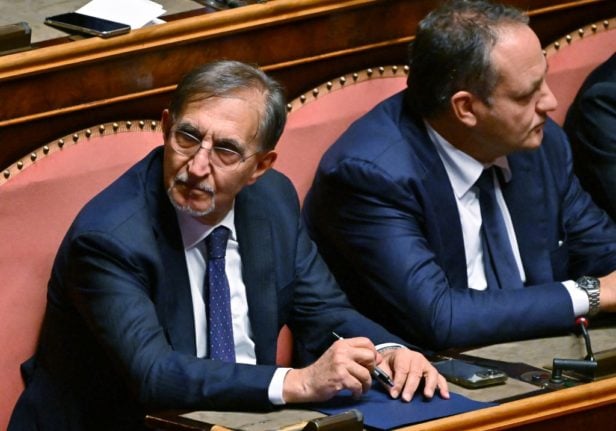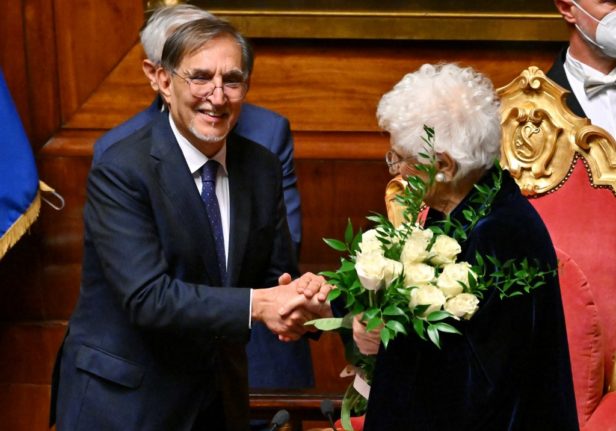Ignazio La Russa, who was elected speaker of the Italian Senate on Thursday, is a far-right veteran known for collecting fascist memorabilia as a hobby.
The 75-year-old also co-founded the post-fascist Brothers of Italy party with Giorgia Meloni, whose victory in last month’s elections put her on course to become prime minister.
READ ALSO: Italy takes rocky first steps toward new government as parliament reopens
As speaker, La Russa will now have the task of guiding legislation through parliament’s upper house, but will also be expected to wield power behind the scenes.
After his appointment on Thursday, Meloni hailed him as a “patriot, a servant of the state” and “an irreplaceable point of reference, a friend, a brother, an example for generations of activists and leaders”.
La Russa has been a part of the nationalist Italian right since the end of the 1960s, when his long hair and beard prompted writer Umberto Eco to compare him to Rasputin.
Politics is in his blood. His landowner father, Antonino La Russa, was a local official in Sicily for Benito Mussolini’s National Fascist Party.
After World War II and the collapse of fascism, he was elected MP and then senator for its successor, the Italian Social Movement (MSI), which was set up by Mussolini’s followers.
‘Different view of history’
Ignazio La Russa, born on July 18th 1947 in Paterno, near Catania, Sicily, has Benito as a middle name and has always been a keen defender of the MSI, saying it was “the party of those who lost the war, but their great merit was to never think of terrorism or rebellion against the democratic choice”.
“Of course, they had a different view of history, but they built a party that could not be more democratic,” he told the Corriere della Sera newspaper earlier this year.
La Russa’s family moved to Milan when he was only 13, and he still lives in the northern city, the capital of the Lombardy region.
READ ALSO: EXPLAINED: When will Italy have a new government?
During his studies – he trained as a lawyer – La Russa was an activist with the MSI’s youth wing (Fronte della Gioventù) and, at the age of 38, he became an MSI regional councillor in Lombardy.
From the early 1990s he was in parliament for the MSI first, then, when it was dissolved, for its successor, National Alliance, and finally as part of a right-wing coalition led by Silvio Berlusconi.
La Russa served as defence minister during Berlusconi’s 2008-2011 government, where he was credited with persuading the then premier to take part in the war in Libya that effectively ended the Kadhafi regime.

Heirs to ‘Il Duce’
While rejecting the autocratic nature of the Mussolini regime, La Russa, much like Meloni, has maintained a level of ambiguity about his party’s neo-fascist roots.
When his brother Romano, head of security in the Lombardy region, drew criticism during the election campaign by giving the fascist salute at the funeral of a far-right activist, La Russa said that it was a “serious mistake”.
But, a few days later, he asserted on television that “we are all heirs of Il Duce [Benito Mussolini], in the sense that we are heirs of our fathers and our grandparents”.
EXPLAINED: Is Brothers of Italy a ‘far right’ party?
La Russa often uses humour to brush off criticism of his views.
In February 2020, mocking social distancing rules recommended to protect against coronavirus, he urged on Twitter: “Do not shake hands with anyone, the infection is lethal. Use the Roman salute, anti-virus and anti-microbial.”
He later deleted the message.
In 2018, Italy’s Corriere della Sera visited his Milan home and filmed his collection of fascist relics, which include statues and medals of Mussolini, photos and books on the black shirts and colonial Italy.
He is also a fan of American history – he named his three sons after Native American tribes or warriors: Antonino Geronimo, Lorenzo Cochis, and Leonardo Apache.



 Please whitelist us to continue reading.
Please whitelist us to continue reading.
Member comments